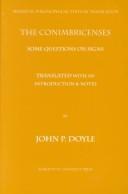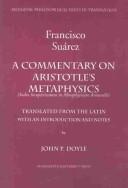| Listing 1 - 10 of 10 |
Sort by
|

ISBN: 0874622417 Year: 2001 Publisher: Milwaukee (Wis.) : Marquette university press,
Abstract | Keywords | Export | Availability | Bookmark
 Loading...
Loading...Choose an application
- Reference Manager
- EndNote
- RefWorks (Direct export to RefWorks)
Semiotics. --- Philosophy, Medieval. --- Aristotle. --- Philosophy, Medieval --- Semiotics --- Semeiotics --- Semiology (Linguistics) --- Semantics --- Signs and symbols --- Structuralism (Literary analysis) --- Medieval philosophy --- Scholasticism --- Aristoteles.
Book
ISBN: 0874622360 Year: 1995 Publisher: Milwaukee Marquette university press
Abstract | Keywords | Export | Availability | Bookmark
 Loading...
Loading...Choose an application
- Reference Manager
- EndNote
- RefWorks (Direct export to RefWorks)
Metaphysics --- -Ontology --- -Being --- Philosophy --- Necessity (Philosophy) --- Substance (Philosophy) --- God --- Ontology --- Philosophy of mind --- Early works to 1800 --- Early works to 1800. --- -Early works to 1800

ISBN: 0874622433 9780874622430 Year: 2006 Volume: 40 Publisher: Milwaukee Marquette university press
Abstract | Keywords | Export | Availability | Bookmark
 Loading...
Loading...Choose an application
- Reference Manager
- EndNote
- RefWorks (Direct export to RefWorks)
Metaphysics --- God --- Ontology --- Philosophy --- Philosophy of mind --- Aristotle. --- Aristoteles. --- Metaphysics. --- Aristotle. - Metaphysics.
Book
ISBN: 087462245X 9780874622454 Year: 2006 Publisher: Milwaukee Marquette university press
Abstract | Keywords | Export | Availability | Bookmark
 Loading...
Loading...Choose an application
- Reference Manager
- EndNote
- RefWorks (Direct export to RefWorks)
Relation (Philosophy) --- Relation (philosophie) --- Ontology. --- Ontologie. --- Transcendentals. --- Transcendantaux. --- Ontology --- Transcendentals --- Logic --- Philosophy --- Being --- Metaphysics --- Necessity (Philosophy) --- Substance (Philosophy)
Book
ISBN: 0874622476 9780874622478 Year: 2008 Publisher: Milwaukee Marquette university press
Abstract | Keywords | Export | Availability | Bookmark
 Loading...
Loading...Choose an application
- Reference Manager
- EndNote
- RefWorks (Direct export to RefWorks)
Book
ISBN: 9789058678959 9058678954 Year: 2012 Volume: 44 Publisher: Leuven Leuven University Press
Abstract | Keywords | Export | Availability | Bookmark
 Loading...
Loading...Choose an application
- Reference Manager
- EndNote
- RefWorks (Direct export to RefWorks)
Sylvester Mauro, S.J. (1619-1687) noted that human intellects can grasp what is, what is not, what can be, and what cannot be. The first principle, 'it is not possible that the same thing simultaneously be and not be, ' involves them all. The present volume begins with Greeks distinguishing 'being' from 'something' and proceeds to the late Scholastic doctrine of 'supertranscendental being', which embraces both. On the way is Aristotle's distinction between 'being as being' and 'being as true' and his extension of the latter to include impossible objects.
Metaphysics --- Theory of knowledge --- Ontology --- Knowledge, Theory of --- Transcendentalism --- Academic collection --- 141.31 --- Scholastiek. Terminisme. Nominalisme. Conceptualisme. Thomisme --- 141.31 Scholastiek. Terminisme. Nominalisme. Conceptualisme. Thomisme --- Philosophy --- Philosophy, Modern --- Idealism --- Being --- Necessity (Philosophy) --- Substance (Philosophy) --- Epistemology --- Psychology
Book
ISBN: 9461660685 9789461660688 9789058678959 9058678954 Year: 2012 Publisher: Leuven, Belgium Leuven University Press
Abstract | Keywords | Export | Availability | Bookmark
 Loading...
Loading...Choose an application
- Reference Manager
- EndNote
- RefWorks (Direct export to RefWorks)
Sylvester Mauro, S.J. (1619-1687) noted that human intellects can grasp what is, what is not, what can be, and what cannot be. The first principle, 'it is not possible that the same thing simultaneously be and not be, ' involves them all. The present volume begins with Greeks distinguishing 'being' from 'something' and proceeds to the late Scholastic doctrine of 'supertranscendental being', which embraces both. On the way is Aristotle's distinction between 'being as being' and 'being as true' and his extension of the latter to include impossible objects.
Transcendentalism. --- Knowledge, Theory of. --- Ontology. --- Philosophy --- Philosophy, Modern --- Idealism --- Epistemology --- Theory of knowledge --- Psychology --- Being --- Metaphysics --- Necessity (Philosophy) --- Substance (Philosophy) --- Ontology --- Knowledge, Theory of --- Transcendentalism
Book
ISBN: 9780874627213 0874627214 Year: 2013 Publisher: Madison Marquette university press
Abstract | Keywords | Export | Availability | Bookmark
 Loading...
Loading...Choose an application
- Reference Manager
- EndNote
- RefWorks (Direct export to RefWorks)
Philosophy, Medieval --- Medieval philosophy --- Scholasticism
Dissertation
ISBN: 9780874628173 Year: 2013 Publisher: Madison Marquette university press
Abstract | Keywords | Export | Availability | Bookmark
 Loading...
Loading...Choose an application
- Reference Manager
- EndNote
- RefWorks (Direct export to RefWorks)
Philosophy, Ancient --- Philosophy, Medieval --- Aristoteles. --- Augustine, --- Plato. --- Thomas,
Book
ISBN: 9789058677372 9058677370 Year: 2010 Volume: 37 Publisher: Leuven Leuven University Press
Abstract | Keywords | Export | Availability | Bookmark
 Loading...
Loading...Choose an application
- Reference Manager
- EndNote
- RefWorks (Direct export to RefWorks)
Philosophy, Spanish --- Philosophie espagnole --- Suarez, Francisco, --- 1 SUÁREZ, FRANCISCO --- Filosofie. Psychologie--SUÁREZ, FRANCISCO --- Academic collection --- Suárez, Francisco, --- Doctor Eximio, --- Eximio, --- Soarez, Francisco, --- Soarius, Franciscus, --- Suárez de Toledo Vázquez de Utiel y González de la Torre, Francisco, --- Suárez, Francis, --- Suárez, Franciscus, --- Suarez, Franciszek, --- Suárez, François, --- Suarez, Franz, --- Suarius, Franciscus, --- Svarius, Franciscus, --- Suárez, Francisco --- Suarez, Francisco, - 1548-1617
| Listing 1 - 10 of 10 |
Sort by
|

 Search
Search Feedback
Feedback About UniCat
About UniCat  Help
Help News
News